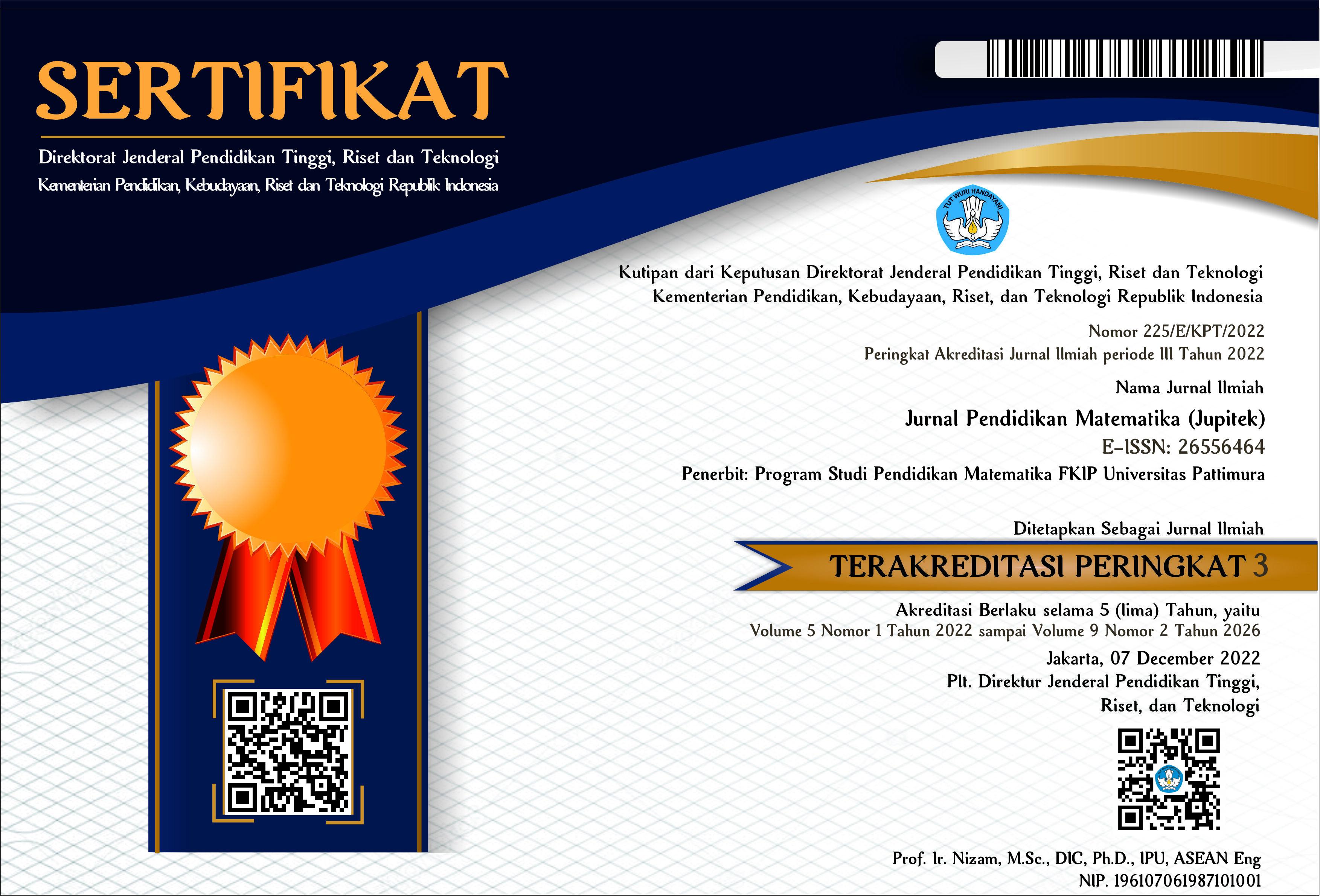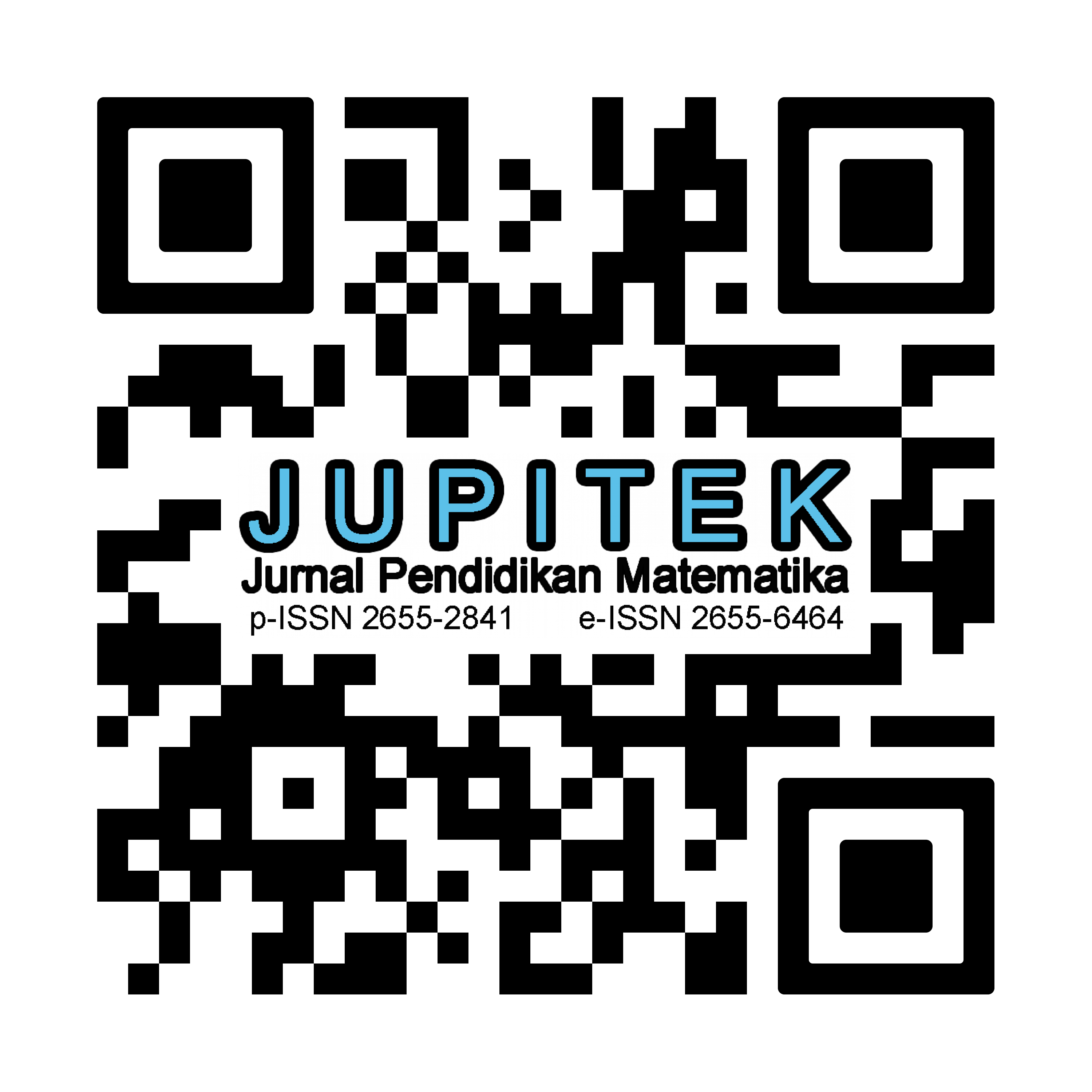PROFIL HASIL BELAJAR SISWA PADA MATERI PERBANDINGAN MELALUI PENGGUNAAN MODEL QUANTUM TEACHING DI KELAS VII SMP NEGERI 6 AMBON
Abstract
The aim of this study is to describe the profile of student learning outcomes in theproportion material using Quantum Teaching model. This type of research is Classroom Action Research. The research subjects were students of grade VII9 of SMP Negeri 6 Ambon. This research data is in the form of learning outcomes tests (quantitative data) and observation sheets of teacher and student activities (qualitative data). Quantitative data were analyzed using descriptive statistics, while qualitative data were analyzed by reducing data, describing data, and concluding data. This study produced a profile of student learning outcomes, namely in the first cycle, there were 7 students (24.13%) completed and 22 students (75.87%) were not completed while in the second cycle, there were 23 students (79.31%) completed and 6 students (20.68%) have not completed
Downloads
References
De Porter., dkk. 2001.Quantum Teaching. Bandung: Kaifa.
-------------------, 2011.Quantum Teaching. Bandung: Kaifa.
Herdian. 2009. Artikel PembelajaranQuantum, diaksespadatanggal 29 September 2012.
Joyce B., dkk. 2011.Models of Teaching, 8th Edition. Jakarta: Insan
Mataheru, W. 2008. Analisis Proses Kognitif Siswa SD Dalam Pemecahan Masalah Matematika Ditinjau Dari Perbedaan Kemampuan. Buletin Pendidikan Matematika No.1 Vol 10, Maret 2008, Ambon: Program Studi Pendidikan Matematika Universitas Pattimura.
Miftahul. A. 2010. Quantum Teaching. Jogjakarta: Diva Press.
Ratumanan, T. G. 2004. Belajar dan Pembelajaran, Surabaya: Unesa University Press
Sanjaya, W. 2010. Strategi Pembelajaran Berorientasi Standar Proses Pendidikan. Jakarta: Kencana
-------------------. 2011. Perencanaan dan Desain Sistem Pembelajaran. Jakarta: Kencana.
Sudjana, N. 2002. Penilaian Hasil Dan Proses Belajar Mengajar. Bandung. Remaja Rosdakarya
Suryosubroto. 2002. Proses BelajarMengajar. Jakarta.
Tanudjaja, M, 2011. Aku Cerdas Karena Tidak Bisa Matematika. Jakarta: Pt. Gramedia Pustaka Utama.
Yamin, 2010.Strategi Pembelajaran Berbasis Kompetensi. Jakarta: Press
Copyright (c) 2018 Ferly Lewier, Edith Tutuhatunewa, Wilmintjie Mataheru

This work is licensed under a Creative Commons Attribution-NonCommercial-ShareAlike 4.0 International License.
License and Copyright Agreement
By submitting a manuscript to Jurnal Pendidikan Matematika (JUPITEK), the author(s) certify and agree to the following terms:
- Originality and Authority: The submitting author is authorized by all co-authors to enter into this agreement. The manuscript describes original work that has not been published previously in a peer-reviewed journal, nor is it under consideration for publication elsewhere.
- Approval: Its publication has been approved by all author(s) and by the responsible authorities of the institutions where the work was carried out.
- Rights: The authors secure the right to reproduce any material that has already been published or copyrighted elsewhere.
- Licensing and Copyright: Authors retain the copyright to their work.
- License Grant: The authors grant Jurnal Pendidikan Matematika (JUPITEK) the right of first publication, with the work simultaneously licensed under the Creative Commons Attribution-NonCommercial-ShareAlike 4.0 International (CC BY-NC-SA 4.0).
- Self-Archiving: Authors are permitted and encouraged to deposit the published version of their article in institutional repositories, on their personal websites, and other academic platforms, with proper acknowledgment of its initial publication in Jurnal Pendidikan Matematika (JUPITEK).






.png)


